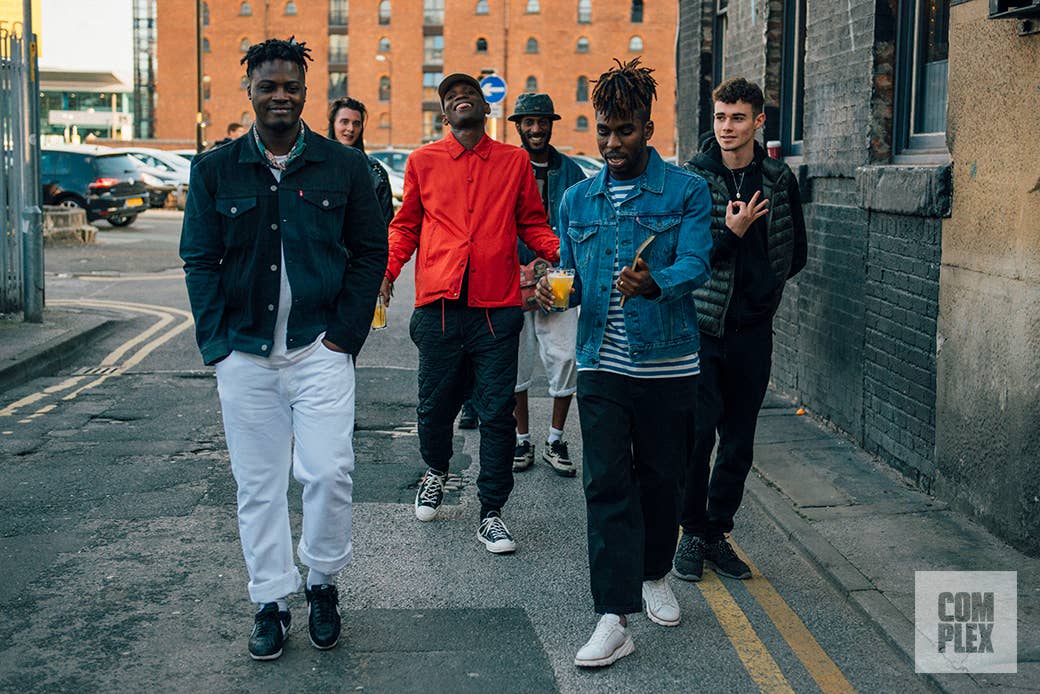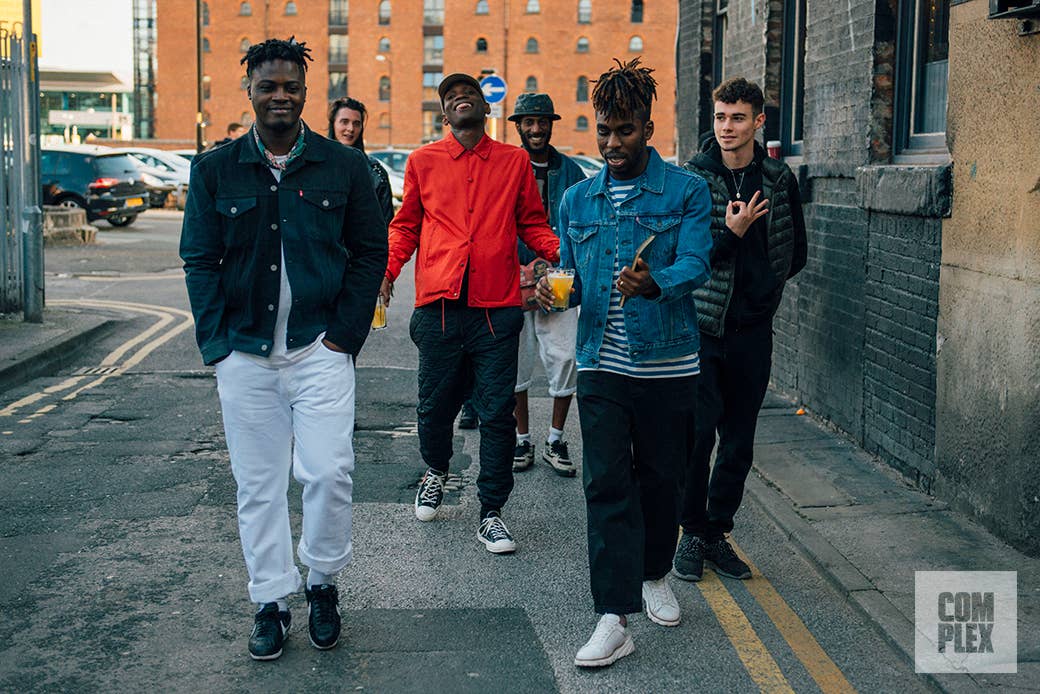
Welcome to My Block—a new series, part of the Levi’s® Music Project, where we take you to the block, estate, ends (or semi-detached—we don’t discriminate) of some of the UK’s brightest music talents. Here, we’re given first-hand accounts of their musical backgrounds and how their area and their community helped shape them into the musicians they are today. For our second trip, we head over to Manchester to meet boundary-pushing soul singer Bipolar Sunshine and producer Jazz Purple. Get to know.
Manchester’s musical history is a long and storied one. Oasis, Joy Division, The Smiths, The Stone Roses, and of course the infamous Hacienda have all had countless books and column inches written about them over the years. That list may seem like a very “white boys with guitars” kind of list on the surface, but if you look a little deeper, as we found out from singer-songwriter Bipolar Sunshine and producer Jazz Purple, the city’s musical DNA is much more eclectic. Soul, funk, punk, hip-hop, rock, reggae, D&B and more have found strong support in Manchester over the years and the internet only kicked that into overdrive.
Once that happened, hip-hop became as popular in areas like Longsight and Chorlton as the acid house psychedelia blasting out the car stereos of their youth. ‘90s rave music in this city clearly influenced the way that music was consumed—particularly in the area of Moss Side that Bipolar Sunshine grew up in. The sound of cars blasting acid house to the furthest reaches of every estate has seeped into Manchester’s make-up, and has audibly informed both artists’ sounds. Music as a means of expression and escapism is inextricably linked in Manchester; possibly, as Jazz Purple suggests, because the weather is so miserable that escaping through music is an irresistible prospect.
“I can remember being about seven, walking out outside my house and it was just acid house playing from people’s cars.”


So, first question: what blocks are you repping?
Bipolar Sunshine: My block is all the places I find myself in from day to day. Being around the early days of making music, it’s Chorlton and South Manchester. Apart from that, my block is where I create and where people come to chill.
Jazz Purple: For me, my block is Longsight in Manchester. I was born in Nigeria and I moved here when I was four so I only ever made music in my room. My block, in terms of creating, is quite a hard concept for me to think about because my work is expansive. Making music, it turns out that my block is the world because of the internet. It’s hard to think about a time because, when you came to my block, we weren’t chilling in the block—we were just collaborating, making music in my room. It’s different because Manchester isn’t as open as somewhere like London.
How did growing up in these areas affect you?
Bipolar Sunshine: I think it just gave us a different energy and another angle to view things from. We had to fight for our creative scene. Taking on board that we know where we’re from, and make music reflecting our realities here, it’s going to have a have a different tinge on it.
Jazz Purple: The weather’s very dark, strange and grey up North. That’s the general overhang; I feel that the people up North are escapists. When I create, I find myself looking out the window and it’s grey; we don’t want to be here, so it’s just like “Let’s get ourselves out of here!” Look at people like The Beatles, why else would they want to go and travel the world? They wanted to get the hell out of Merseyside!
“When Frosties gave away those CDs allowing you to play with audio forms—I was hooked! From there, I moved on to Fruity Loops.”
How did you both get into music?
Jazz Purple: When Frosties gave away those CDs that you could make music on, do you remember that? Honestly, think about it. I moved from Nigeria to England when I was four. In primary school, they wanted us to play music and I learnt clarinet. When I first heard a Lighthouse Family song on the radio, I was six and it moved me. You know when bass, chord, mood and harmony collide? It was heavenly to me. It was a moment, hearing Lighthouse Family. I was taken away by everything and, as soon as that happened, I knew I wanted to make music. Then Frosties started giving away the CDs, allowing you to play with audio forms—I was hooked! From there, I moved on to Fruity Loops.
Bipolar Sunshine: I didn’t come through on that Frosties wave, the Shreddies wave or the Weetabix wave [laughs]. I grew up in a household where my mum was playing loads of records. One time I was on holiday in Jamaica wearing some straight shower shorts. I was just sat there on the bed, there was some girl outside and I just started writing a story about us going off to crazy places and shit. It was just easy for me—the writing process, the story, just putting it down. It was something I felt that I could do. I mainly enjoyed singing and writing, but then I got into the garage side. My raps weren’t really MC bars, but I knew how to find my way.
Jazz Purple: Top quality. Always top quality! Your bars are always top quality.
Bipolar Sunshine: I don’t think people understood them at the time, because what I was doing didn’t fit the mold and the current scene. But it’s a breakthrough, finding my voice.



As young musicians, which artists would you say inspired you?
Bipolar Sunshine: In my younger days, we were listening to Cash Money, Master P, No Limit. But then we mixed that with acid house. I can remember being about 7, walking outside my house and it was just acid house playing from peoples cars. I don’t think people in London experienced that. We had it different.
Jazz Purple: You know what? 2Pac was a big influence in Longsight. Longsight / Manchester / London / LA, it’s all the same thing with the internet. West Coast music was in Manchester and so was '90s rave music—it was just crazy! Our influences were a mixture of being plugged into the internet, connecting us to West Coast hip-hop and mixing that with local artists.
What was the sense of community like then, and how did it help or hinder your creative process?
Bipolar Sunshine: The first place that I lived in was Moss Side. It was a big community; I still hang around with people from that community today. When I moved to Chorlton, you could knock anyone’s house for sugar and that community spirit inspired us at GREY [the Manchester-based creative collective founded by Bipolar Sunshine, Jazz Purple and others] to collaborate and do what we do together, collectively helping each other.
Jazz Purple: We’re all online and fucking wild. No one’s holding us back now. I skipped an academic year and went from a small school in Longsight to a private school with kids from all over Greater Manchester. As soon as I landed there, I’ve never met so many groups of people. I was coming from being the majority to being the minority; that’s a complete flip on its head. That’s where my understanding of community came from—going to a high school with everyone from Greater Manchester.
Where do your musical aliases originate from?
Bipolar Sunshine: I had the name for a while. When I was in my other band [Kid British] I just knew if I was going to call myself something, what it would be, and the name said everything. It was my take on looking out on the grey sky when I see the sunshine through the rain. I would see the light and still be able to deflect my day and that’s what allows me to write such a high track through to a low track.
Jazz Purple: For me, Purple came first and it has a religious theme. Purple is very rich; it reminds me of my teacher growing up who only ever wore purple. She was religious and connected with students—I’ve never met anyone so loud. Purple is just an esteemed colour; it’s so rich. Then Jazz, it’s free in its form, because music, when someone thinks of music they think of genres. But I think of music as being formless, like jazz music, blending everything into beats per minute.


“The weather’s very dark, strange and grey up north. that's the general overhang; i feel that the people up north are escapists.”
As artists now, you do a lot of collaborations. Who else would you like to work with down the line?
Bipolar Sunshine: It depends, really. You know when you meet someone and you both get on and have a rapport? For me, it’s more that vibe. So instead of me saying “I want to work with this person”, I may not vibe with them. Collaborating is a very personal experience, so I want to meet the person first and catch a vibe with them.
It’s an exciting time for you guys right now; what do you have coming up?
Bipolar Sunshine: We have a tour in America booked in for next year, releases coming out from GREY, and the amount of work that’s coming from people in the team that we are moving with—it’s amazing. Everyone is about to do something, and we’re all collaborating, branching out, and just taking over. I’m enjoying my own wave right now.
Jazz Purple: I want this to expand as a brand, like a business—not just music. We’re a conglomerate of people that have ownership. We don’t have to clear samples over anything, because we have ownership. And, as a brand moving forward, the expansion is massive. It’s unstoppable.
Both of you have come from different paths to music, so what would your advice be to the youth that want to create?
Bipolar Sunshine: For me, it’s mostly about the community and collective you can create around you. If you have a voice, you can start to create and connect—if you apply that form. Use the internet to your advantage, too.
Jazz Purple: It’s no lie: the music business is a very tricky thing. For young people that want to get involved in the music business, it’s about waiting for your time to come around. Do you love this? That’s the first start. There’s a time to make art and a time to sell art. So you need to be in a mind state of understanding.
Bipolar Sunshine: Being able to find something that is you is important. The more you are you, the more it shines through and the more people fuck with it.
Jazz Purple: You can be in the music business in many ways. It isn’t just the artist. It’s the lighting, the manager, the journalist, the A&R, the label—everyone.
As part of the Levi’s® Music Project, Levi’s® and Skepta have partnered to establish a community youth music project in the heart of Skepta’s hometown of Tottenham, North London. The space will provide access to music for local children and inspire the next generation. The centrepiece of the first series of classes will be a performance in the famous V&A museum on November 5, where the students will show the world what they’ve been working on.
For more information on the Levi’s® Music Project, head here.



Bipolar Sunshine wears Levi’s® 501 jeans and trucker jacket.
Jazz Purple wears Levi’s® trucker jacket.

